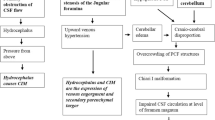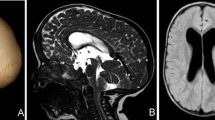Abstract
Intoduction
Hydrocephalus has been related to Chiari type I malformation (CIM) for a long time. The pathogenesis of this association is complex and still debated.
Discussion
A supratentorial hypertensive hydrocephalus may cause CIM, exerting pressure from above. Another pathogenetic hypothesis is based on the clinical and radiological data from patients affected by complex craniosynostosis, in which this association is more commonly observed as the consequence of a “cephalo-cranial disproportion” ultimately leading to a secondary hydrocephalus. In some cases, the concomitant presence of a stenosis of the jugular foramina would determine a condition of upward venous hypertension, resulting in the development of CIM and an associated hydrocephalus due to cerebellar parenchyma turgor.
Conclusions
The radiological association of ventricular enlargement and hindbrain herniation would be the result of heterogeneous pathogenetic mechanisms which would then require specific therapeutic approaches. In this context, the endoscopic third ventricle-cisternostomy is gaining an increasing interest because of its more physiologic correction of the altered CSF dynamics and its minor interference on the developmental processes responsible for the association of hydrocephalus and CIM.








Similar content being viewed by others
References
Amacher AL, Page LK (1971) Hydrocephalus due to membranous obstruction of the fourth ventricle. J Neurosurg 35(6):672–676
Banik R, Lin D, Miller NR (2006) Prevalence of Chiari I malformation and cerebellar ectopia in patients with pseudotumor cerebri. J Neurol Sci 247(1):71–75
Bejjani GK (2003) Association of the adult Chiari malformation and idiopathic intracranial hypertension: more than a coincidence. Med Hypotheses 60(6):859–863
Britto JA, Chan JC, Evans RD, Hayward RD, Thorogood P, Jones BM (1998) Fibroblast growth factor receptors are expressed in craniosynostotic sutures. Plast Reconstr Surg 101(2):540–543
Caldarelli M, Novegno F, Di Rocco C (2009) A late complication of CSF shunting: acquired Chiari I malformation. Childs Nerv Syst 25(4):443–452
Chiari H (1891) Uber Veränderungen des Kleinhirns infolge von Hydrocephalie des Grosshirns. Dtsch Med Wochenschr 17:1172–1175
Cinalli G, Renier D, Sebag G, Sainte-Rose C, Arnaud E, Pierre-Khan A (1995) Chronic tonsillar herniation in Crouzon’s and Apert’s syndromes: the role of premature synostosis of the lambdoid suture. J Neurosurg 83(4):575–582
Cinalli G, Sainte-Rose C, Kollar E, Arnaud E, Renier D (1998) Hydrocephalus and craniosynostosis. J Neurosurg 88(2):209–214
Cinalli G, Spennato P, Sainte-Rose C, Arnaud E, Aliberti F, Brunelle F, Cianciulli E, Renier D (2005) Chiari malformation in craniosynostosis. Childs Nerv Syst 21(10):889–901
Decq P, Le Guérinel C, Sol JC, Brugières P, Djindjian M, Nguyen JP (2001) Chiari I malformation: a rare cause of noncommunicating hydrocephalus treated by third ventriculostomy. J Neurosurg 95(5):783–790
Di Rocco C, Di Trapani G, Pettorossi VE, Caldarelli M (1979) On the pathology of experimental hydrocephalus induced by artificial increase in endoventricular CSF pulse pressare. Childs Brain 5(2):81–95
Di Rocco C, Maira G, Rossi GF, Vignati A (1976) Cerebrospinal fluid pressare studies in normal pressare hydrocephalus and cerebral atrophy. Eur Neurol 14(2):119–128
Di Rocco C, Massimi L, Tamburrini G (2006) Shunts vs endoscopic third ventriculostomy in infants: are there different types and/or rates of complications? A review. Childs Nerv Syst 22(12):1573–1589
Di Rocco C, Rende M (1987) Neural tube defects. Some remarks on the possible role of glycosaminoglycans in the genesis of the dysraphic state, the anomaly in the configuration of the posterior cranial fossa, and hydrocephalus. Childs Nerv Syst 3(6):334–341
Di Rocco F, Jucá CE, Arnaud E, Renier D, Sainte-Rose C (2010) The role of endoscopic third ventriculostomy in the treatment of hydrocephalus associated with faciocraniosynostosis. J Neurosurg Pediatr 6(1):17–22
Di Rocco C, Pettorossi VE, Caldarelli M, Mancinelli R, Velardi F (1978) Communicating hydrocephalus induced by mechanically increased amplitude of the intraventricular cerebrospinal fluid pressure: experimental studies. Exp Neurol 59(1):40–52
Du Bulay G, Shah SH, Currie JC, Logne V (1974) The mechanism of hydromyelia in Chiari type I malformation. Br J Radiol 47(561):579–587
Elster AD, Chen MY (1992) Chiari I malformations: clinical and radiological reappraisal. Radiology 183(2):347–353
Ersahin Y, Gokcay A (2002) Acquired Chiari I malformation changes postendoscopic third ventriculostomy. Pediatr Neurosurg 36(1):54
Fagan LH, Ferguson S, Yassari R, Frim DM (2006) The Chiari pseudotumor cerebri syndrome: symptom recurrence after decompressive surgery for Chiari malformation type I. Pediatr Neurosurg 42(1):14–19
Francis PM, Beals S, Rekate HL, Pittman HW, Manwaring K, Reiff J (1992) Chronic tonsillar herniation and Crouzon’s syndrome. Pediatr Neurosurg 18(4):202–206
Fukuhara T, Vorster SJ, Luciano MG (2000) Risk factors for failure endoscopic third ventriculostomy for obstructive hydrocephalus. Neurosurgery 46(5):1100–1111
Grabb P, Mapstone T, Oakes WJ (1999) Ventral brainstem compression in pediatric and young adult patients with Chiari I malformations. Neurosurgery 44(3):520–528
Gray JL, Kang SS, Zenni GC, Kim DU, Kim PI, Burgess WH, Drohan W, Winkles JA, Haudenschild CC, Greisler HP (1994) FGF-1 affixation stimulates ePTFE endothelialization without intimal hyperplasia. J Surg Res 57(5):596–612
Gripp KW, Hopkins E, Doyle D, Dobyns WB (2010) High incidence of progressive postnatal cerebellar enlargement in Costello syndrome: brain overgrowth associated with HRAS mutations as the likely cause of structural brain and spinal cord abnormalities. Am J Med Genet 152A(5):1161–1168
Hackel M, Benes V, Mohapl M (2001) Simultaneous cerebral and spinal fluid pressure recordings in surgical indications of the Chiari malformation without myelodysplasia. Acta Neurochir 143(9):909–918
Hashish H, Guenot M, Mertens P, Sindou M (1999) Hydrocéphalie chronique de l’adulte par occlusion membranaire congénitale de l’ouverture médiane du quatrième ventricule (Foramen de Magendie). Rapport de deux cas et revue de la literature. Neurochirurgie 45(3):232–236
Hayhurst C, Osman-Farah J, Das K, Mallucci C (2008) Initial management of hydrocephalus associate with Chiari malformation type I-syringomyelia complex via endoscopic third ventriculostomy: an outcome analysis. J Neurosurg 108(6):1211–1214
Hoffman HJ, Tucker WS (1976) Cephalocranial disproportion. A complication of the treatment of hydrocephalus in children. Childs Brain 2(3):167–176
Hofmann E, Warmuth-Metz M, Bendszus M, Solymosi L (2000) Phase-contrast MR imaging of the cervical CSF and spinal cord: volumetric motion analysis in patients with Chiari I malformation. AJNR 21(1):151–158
Holder-Espinasse M, Winter RM (2003) Type 1 Chiari malformation and Noonan syndrome: a new diagnostic feature? Clin Dysmorphol 12(4):275
Kandasamy J, Kneen R, Gladstone M, Newman W, Mohamed T, Mallucci C (2008) Chiari I malformation without hydrocephalus: acute intracranial hypertension managed with endoscopic third ventriculostomy. Childs Nerv Syst 24(12):1493–1497
Kratz CP, Zampino G, Kriek M, Kant SG, Leoni C, Pantaleoni F, Oudesluys-Murphy AM, Di Rocco C, Kloska SP, Tartaglia M, Zenker M (2009) Craniosynostosis in patients with Noonan syndrome caused by germline KRAS mutations. Am J Med Genet A 149A(5):1036–1040
Kreiborg S, Marsh JL, Cohen MM Jr, Liversage M, Pedersen H, Skovby F, Borgesen SE, Vannier MW (1993) Comparative three-dimensional analysis of CT-scans of the calvaria and cranial base in Apert and Crouzon syndrome. J Craniomaxillofac Surg 21(5):181–188
Lee M, Rezai AR, Wisoff JH (1995) Acquired Chiari I malformation and hydromyelia secondary to a giant craniopharingioma. Pediatr Neurosurg 22(5):251–254
Lemire RJ, Loeser JD, Leech RW (1975) Normal and abnormal development of the human nervous system. Harper and Row, Hagerstown, pp 95–108
Marin-Padilla M, Marin-Padilla TM (1981) Morphogenesis of experimentally induced Arnold-Chiari malformation. J Neurol Sci 50(1):29–55
Martinez-Lage JF, Guillén-Navarro E, Almagro MJ, Felipe-Murcia M, López López-Guerrero A, Galarza M (2010) Hydrocephalus and Chiari type 1 malformation in macrocephaly cutis marmorata telangiectatica congenita: a case-based update. Childs Nerv Syst 26(1):13–18
Martinez-Perez D, Vander Woude DL, Barnes PD, Scott RM, Mulliken JB (1996) Jugular foraminal stenosis in Crouzon syndrome. Pediatr Neurosurg 25(5):252–255
Massimi L, Novegno F, Di Rocco C (2011) Chiari Type 1 malformation in children. In: Pickard JD (ed) Advances and technical standards in neurosurgery. Springer Verlag, Wien, Vol. 37 (ahead of print)
Massimi L, Pravatà E, Tamburrini G, Gaudino S, Pettorini B, Novegno F, Colosimo C Jr, Di Rocco C (2011) Endoscopic third ventriculostomy for the management of Chiari I and related hydrocephalus: outcome and pathogenetic implications. Neurosurgery 68:950–956
Metellus P, Dufour H, Levrier O, Grisoli F (2002) Endoscopic third ventriculostomy for treatment of noncommunicating syringomyelia associated with a Chiari I malformation and hydrocephalus: case report and pathophysiological considerations. Neurosurgery 51(2):500–503
Milhorat TH, Chou MW, Trinidad EM (1999) Chiari I malformation redefined clinical and radiographic findings for 364 symptomatic patients. Neurosurgery 44(5):1005–1017
Mohanty A, Suman R, Shankar SR, Satish S, Shankar Praharaj S (2005) Endoscopic third ventriculostomy in the management of Chiari I malformation and syringomyelia associated with hydrocephalus. Clin Neurol Neurosurg 108(1):87–92
Nishihara T, Hara T, Suzuki I, Kirino T, Yamakawa K (1996) Third ventriculostomy for symptomatic syringomyelia using flexible endoscope: case report. Minim Invasive Neurosurg 39(4):130–132
Nishikawa M, Sakamoto H, Hakuba A, Nakanishi N, Inoue Y (1997) Pathogenesis of Chiari malformation: a morphometric study o the posterior cranial fossa. J Neurosurg 86(1):40–47
Okudera T, Huang YP, Ohta T, Yokota A, Nakamura Y, Maehara F, Utsunomiya H, Uemura K, Fukasawa H (1994) Development of posterior fossa dural sinuses, emissary veins, and jugular bulb: morphological and radiologic study. Am J Neuroradiol 15(10):1871–1883
Osuagwu FC, Lazareff JA, Rahman S, Bash S (2005) Chiari I anatomy after ventriculoperitoneal shunting:posterior fossa volumetric evaluation with MRI. Childs Nerv Syst 22(11):1451–1456
Park JK, Gleason PL, Madsen JR, Goumnerova LC, Scott RM (1997) Presentation and management of Chiari I malformation in children. Pediatr Neurosurg 26(4):190–196
Rifkinson-Mann S, Sachdev VP, Huang YP (1987) Congenital fourth ventricular midline outlet obstruction. Report of two cases. J Neurosurg 67(4):595–599
Saldino RM, Steinbach HL, Epstein CJ (1972) Familial acrocephalosyndactily (Pfeiffer syndrome). Am J Roentgenol 116(3):609–622
Schijman E, Steinbok P (2004) International survey on the management of Chiari I malformation and syringomyelia. Childs Nerv Syst 20(5):341–348
Sgouros S, Goldin JH, Hockley AD, Wake MJ (1996) Posterior skull surgery in craniosynostosis. Childs Nerv Syst 12(11):727–733
Sgouros S, Natarajan K, Hockley AD, Goldin JH, Wake M (1999) Skull base growth in craniosynostosis. Pediatr Neurosurg 31(6):281–293
Sheehan JM, Jane JA Sr (2000) Resolution of tonsillar herniation and syringomyelia after supratentorial tumor resection: case report and review of the literature. Neurosurgery 47(1):233–235
Stovner LJ, Bergan U, Nilsen G, Sjaastad O (1993) Posterior cranial fossa dimensions in the Chiari I malformation: relation to the pathogenesis and clinical presentation. Neuroradiology 35(2):113–118
Suheiro T, Inamura T, Natori Y, Sasaki M, Fukui M (2000) Successful neuroendoscopic third ventriculostomy for hydrocephalus and syringomyelia associated with fourth ventricle outlet obstruction. J Neurosurg 93(2):326–329
Teo C, Nakaji P, Seisier D, Coughlan M (2005) Resolution of trigeminal neuralgia following third ventriculostomy for hydrocephalus associate with Chiari I malformation: case report. Minim Invasive Neurosurg 48(5):302–305
Tubbs RS, McGirt MJ, Oakes WJ (2003) Surgical experience in 130 pediatric patients with Chiari I malformation. J Neurosurg 99(2):291–296
Tubbs RS, Rutledge SL, Kosentka A, Bartolucci AA, Oakes WJ (2004) Chiari I malformation and neurofibromatosis type 1. Pediatr Neurol 30(4):278–280
Tubbs RS, Lyerly MJ, Loukas M, Shoja M, Oakes WJ (2007) The pediatric Chiari I malformation: a review. Childs Nerv Syst 23(11):1239–1250
Venes JL (1988) Arnold-Chiari malformation in an infant with Kleeblattschadel: an acquired malformation. Neurosurgery 23(3):360–362
Williams B (1975) Cerebrospinal fluid pressure gradients in spina bifida cystic, with special reference to the Arnold-Chiari malformation and aqueductal stenosis. Dev Med Child Neurol 35:138–150
Williams B (1981) Simultaneous cerebral and spinal fluid pressure recordings, 2. Cerebrospinal dissociation with lesions at the foramen magnum. Acta Neurochir 59(1–2):123–142
Williams H (2008) The venous hypothesis of hydrocephalus. Med Hypotheses 70(4):743–747
Williams H (2008) A unifying hypothesis for hydrocephalus, Chiari malformation, syringomyelia, anencephaly and spina bifida. Cerebrospinal Fluid Res 5:7
Zampino G, Pantaleoni F, Carta C, Cobellis G, Vasta I, Neri C, Pogna EA, DeFeo E, Delogu A, Sarlozy A, Atzeri F, Selicorni A, Rauen KA, Cytrymbaum CS, Weksberg R, Dallapiccola B, Ballabio A, Gelb BD, Neri G, Tartaglia M (2007) Diveristy, parental germline origin, and phenotypic spectrum of de novo HRAS missense changes in Costello syndrome. Hum Mutat 28(3):265–272
Author information
Authors and Affiliations
Corresponding author
Rights and permissions
About this article
Cite this article
Di Rocco, C., Frassanito, P., Massimi, L. et al. Hydrocephalus and Chiari type I malformation. Childs Nerv Syst 27, 1653–1664 (2011). https://doi.org/10.1007/s00381-011-1545-3
Received:
Accepted:
Published:
Issue Date:
DOI: https://doi.org/10.1007/s00381-011-1545-3




